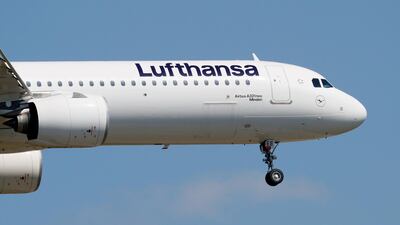Deutsche Lufthansa’s future is in the hands of shareholders, who will on Thursday vote on a €9 billion ($10.2bn, Dh37.34bn) state bailout. If they reject the lifeline, the cash-strapped airline could be tipped into insolvency.
The outcome was thrown into doubt by Heinz Hermann Thiele, 79, one of Germany’s richest men, who built a stake of more than 15 per cent in the operator to become its largest investor. He has said he is unhappy with the deal.
Mr Thiele’s stake gives him the power to thwart the rescue should he choose to do so, after just 38 per cent of investors registered to vote. The measure needs two-thirds support of those in attendance.
The billionaire did not disclose his intentions during talks with Lufthansa and government officials on Monday.
Lufthansa, hit by the coronavirus crisis like its peers across the globe, agreed with the German government on a bailout made up of loans and an equity investment in May. The accord would hand the state a 20 per cent stake at a steep discount, diluting the stakes of shareholders such as Mr Thiele.
With the airline burning through €1 million an hour, time is running out.
Mr Thiele might be playing a high-stakes game of chicken and choose to vote for the rescue package on Thursday. If he does so, the motion should pass, pulling the airline back from the brink – an outcome that management, unions and many investors say they favour.
Guido Hoymann, an analyst at Bankhaus Metzler, said Mr Thiele’s stake would be at risk should he vote against the bailout, potentially forcing Lufthansa into insolvency. His own self-interest suggests he will fall in line at the last minute.
“[Mr] Thiele cannot play hardball to the fullest,” Mr Hoymann said. “All parties depend on the aid package to go through.”
The government has also indicated it has no interest in revising the bailout agreement before the shareholder vote. But who is to say what will happen if it fails? After all, it was Peter Altmaier, Germany’s economy minister, who told Bild newspaper in May that the country would do whatever it takes to save the company.
Sending the airline into insolvency would not look good for the government of Angela Merkel, which has generally won praise for its competent handling of the Covid-19 crisis.
The prospect of negative publicity, together with the threat of thousands of job losses, might be enough to persuade the government to alter the terms of the rescue, perhaps by removing or reducing the contentious stake, according to Ruxandra Haradau-Doeser, an analyst at Kepler Cheuvreux.
“We see a high probability for a Plan B if the capital increase will not be approved,” she said.
Whether Mr Thiele or other shareholders would benefit remains to be seen. The loan portion of the bailout could be extended to Lufthansa with unwelcome conditions restricting job cuts and including measures to reduce the environmental impact of flying.
It is also possible that German officials will baulk at revising the package under pressure from one of the country’s richest men at a time when the economy is suffering its worst slump in decades.
With the bailout thwarted and the airline running out of cash, Mr Thiele could use his sizeable fortune – around $16.9bn (Dh62.1bn) – to carry out a rescue of his own, thus becoming the dominant shareholder.
He announced a plan last Thursday to sell eight million shares of Knorr-Bremse, the Munich brake manufacturer that underpins his fortune, freeing up about $850m in cash. He still owns a majority stake of the company.
Mr Thiele could also provide a loan to Lufthansa, with jets and other assets as collateral, said Mark Manduca, an analyst with Citigroup in London who rates the shares a "sell". It would be a high-risk strategy, but one that offers the former army tank commander the chance to become one of the most powerful players in European aviation. If Lufthansa’s stock price were to climb once the pandemic passes, he would stand to make a new, bigger fortune.
Even if all rescue efforts fail and the airline is forced into insolvency, Lufthansa would not disappear. Under a so-called protective shield from creditors, the airline would be able to restructure its business and cut staff.
Equity and debt holders would suffer losses and hundreds of jets and a chunk of its profitable Lufthansa Technik aircraft maintenance division might well be sold off. Still, a slimmed down version of the airline would take to the skies again.
But a Lufthansa insolvency would be a further blow to Germany’s reputation for business stability after Wirecard’s accounting scandal. It could also hit German finance minister Olaf Scholz’s image and spell the end of chief executive Carsten Spohr’s term at the helm of the airline..
“The aim of the board, obviously, is to avoid an insolvency and all the consequences that would bring,” Mr Spohr said in a letter to employees on Sunday.

